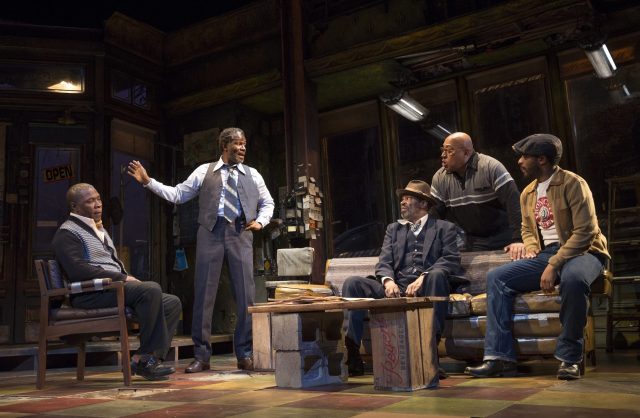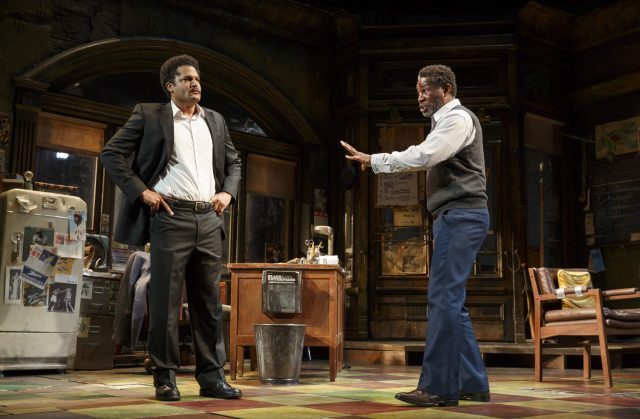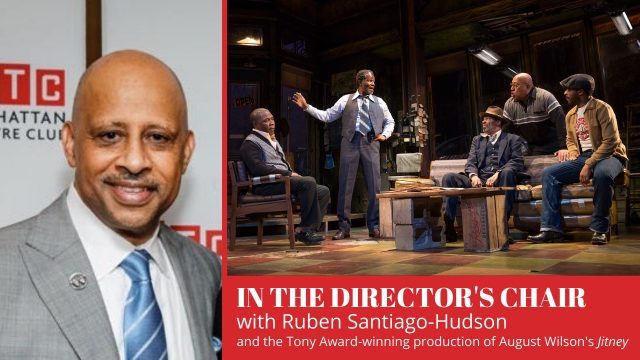
August Wilson’s dazzling JITNEY finally makes its long-awaited Broadway debut (photo © 2017 Joan Marcus)
Manhattan Theatre Club at the Samuel J. Friedman Theatre
261 West 47th St. between Broadway & Eighth Aves.
Tuesday – Sunday through March 12, $79-$169
jitneybroadway.com
www.manhattantheatreclub.com
August Wilson’s Jitney, the first play he wrote in the American Century Cycle, also known as the Pittsburgh Cycle, is the last of the ten plays to reach Broadway, and all one can ask is, What took so long? Jitney is another masterpiece from the Pittsburgh-born playwright, whose cycle comprises ten plays, each set in a different decade of the twentieth century, capturing the black experience in America over one hundred years with grace, honesty, dignity, humor, and a soul-searching reality. Coincidentally, the film version of Wilson’s second play to hit Broadway, the Tony- and Pulitzer Prize-winning Fences, was released in December; the first movie based on a Wilson play, Fences garnered Oscar nominations for Best Picture, Best Actor (director Denzel Washington), Best Supporting Actress (Viola Davis), and Best Adapted Screenplay (Wilson). A Manhattan Theatre Club production at the Samuel J. Friedman Theatre, Jitney takes place in a ramshackle car service office in 1977 in Pittsburgh’s Hill District, where taxis won’t go. The gypsy cab company is run by the soft-spoken, straightforward Becker (John Douglas Thompson). His motley group of drivers consists of Turnbo (Michael Potts), a confrontational gossip who can’t stay out of other people’s business; YoungBlood (André Holland), an angry Vietnam vet trying to provide for his wife, Rena (Carra Patterson), and baby; Fielding (Anthony Chisholm), an aging, stumbling alcoholic who’s been separated from his wife for twenty-two years; and the practical, sensible Doub (Keith Randolph Smith), who is a kind of den father, keeping the peace while spouting such sage phrases as “Time go along and it come around.” Stopping by often is the sharply attired Shealy (Harvy Blanks), who takes phone calls at the station for his numbers racket, and Philmore (Ray Anthony Thomas), a regular customer who drinks himself into oblivion and then needs a ride home. Tensions rise when Becker eventually lets everyone know that the city will be tearing down the building soon, leaving them all jobless, and Becker’s son, Booster (Brandon J. Dirden), arrives after spending twenty years in prison, desperate to reestablish a relationship with his estranged father.

Son Booster (Brandon J. Dirden) and father Becker (John Douglas Thompson) face each other after twenty years in JITNEY (photo © 2017 Joan Marcus)
The Olivier Award-winning Jitney is a glorious play, a spectacular blending of poetic, incisive dialogue, powerful, soaring performances, and intimate, seamless staging by director Ruben Santiago-Hudson, who won a Tony for his role in Wilson’s Seven Guitars, later directed that work as well as the recent Signature revival of the Pulitzer Prize-winning The Piano Lesson (starring Dirden), and was Wilson’s personal choice to portray him in the playwright’s autobiographical one-man show, How I Learned What I Learned. As with virtually every Wilson play, the cast is exceptional, bringing the beautifully developed characters to life in ways that make them feel like they’re your friends or acquaintances. Most of the actors have appeared in previous Wilson shows, including Thomas, who played Becker in Jitney at the Cincinnati Playhouse, and Chisholm, who has been playing Fielding since 1996 and once toured the Hill District with Wilson, who died in 2005 at the age of sixty. So every Wilson show has a welcoming family aspect surrounding it, and Jitney is no exception. When the play ended, I felt a tinge of sadness, wanting to spend more time with every one of these characters. The appropriately musty, messy set, by Tony-winning designer David Gallo (Wilson’s King Headley III, Gem of the Ocean, Radio Golf, 2000 production of Jitney at Second Stage), features ratty chairs and couches, newspaper clippings of Pittsburgh sports teams, an old pot-bellied stove, and large windows across the back of the stage that tantalizingly reveal who’s coming into the station next. Originally written in 1979 and rewritten in 1996, Jitney is very much about taking control of one’s life and being part of something bigger, regardless of the odds. At one point, Doub questions why Becker took so long to tell him about the station being torn down. “That ain’t what I mean, Becker,” Doub says. “It’s like you just a shadow of yourself. The station done gone downhill. Some people overcharge. Some people don’t haul. Fielding stay drunk. I just watch you and you don’t do nothing.” “What’s to be done?” Becker responds, adding “I just do the best I can do,” to which Doub boldly replies, “Sometime your best ain’t enough.” Like the rest of the dialogue, those words hit hard, resonating loud and clear in this stunning triumph.


